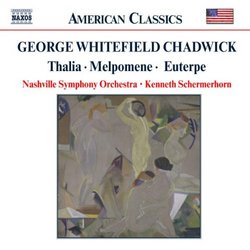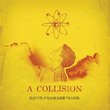| All Artists: George Whitefield Chadwick, Kenneth Schermerhorn, Nashville Symphony Title: Chadwick: Orchestral Works Members Wishing: 0 Total Copies: 0 Label: Naxos American Original Release Date: 1/1/2002 Re-Release Date: 7/16/2002 Genre: Classical Styles: Forms & Genres, Theatrical, Incidental & Program Music, Historical Periods, Classical (c.1770-1830), Symphonies Number of Discs: 1 SwapaCD Credits: 1 UPC: 636943911723 |
Search - George Whitefield Chadwick, Kenneth Schermerhorn, Nashville Symphony :: Chadwick: Orchestral Works
 | George Whitefield Chadwick, Kenneth Schermerhorn, Nashville Symphony Chadwick: Orchestral Works Genre: Classical
|
Larger Image |
CD DetailsSimilarly Requested CDs
|
CD Reviews"American Classics" Series Turns Up Near Classics 08/21/2002 (5 out of 5 stars) "As you can guess if you're not familiar with this valuable series from Naxos, the majority of the music recorded is not quite classic in status, but even if Naxos digs up forgotten music that cries out to be heard again, they're more than doing their job, as far as I'm concerned. With George Whitefiled Chadwick, we have a sadly underrated American composer who should be heard today. As Naxos'notes to the recording say, "Chadwick became the fist composer of concert music whose works often show the snap, the wit, the independence of the American." Look no further than the two finest pieces on the disc, Euterpe and and Thalia, for a confirmation of this assessment. My favorite of all is Euterpe, a tribute to the Greek muse of Music. Eurterpe is celebrated with the dance: despite more lyrical interpolations, Chadwick's tribute struts along with the bounce and vigor of a cakewalk. This is wonderfully American music indeed, definitely parting company with Chadwick's contemporaries who wrote transplanted Germanic music, such as McDowell and Horatio Parker and, early on at least, Griffes. Thalia is the muse of Comedy, and Chadwick creates another bouncy portrait, a scherzo of Mendelsohnian lightness and charm, though it doesn't sound like Mendelssohn, except maybe Mendelssohn filtered through the music of Sir Arthur Sullivan. Chadwick, after all, did not composer in a vacuum. In the more serious Angel of Death and Melpomene (muse of Tragedy), Chadwick sometimes sounds like Franck or, especially in Angel of Death, like Richard Strauss. In fact, the senario of Chadwick's work is very much like that of Death and Transfiguration, though Chadwick's work is not quite as heaven storming, mostly to its benefit, I think. And if Chadwick's apotheosis isn't as grandiose as Strauss's, Angel of Death is still a dramatically telling work that should be reinstated to the concert halls--especially for those who've grown tired of the bombast of Liszt and Strauss.The most ambitious work on this disc is Aphrodite, which has an Impressionistic scenario a la Debussy and Resphigi. The tone poem tries to recreate the scenes that took place around a statue of Aprhodite situated on some Greek coast or other. So we have moonlight on the sea, a storm at sea, a march-by of a great army, and so forth. Unfortunately, the more dramatic moments such as the storm and march scenes don't recall Strauss or Resphigi but lesser movie music, and the whole affair seems less compelling than any of the other music on this disc. But it does show a more progressive side of Chadwick: if mostly the orchestral effects in Aphrodite are more Germanic than Gallic in nature, Chadwick does seem to have learned a thing or two from Debussy. A repeated figure for celesta and muted trumpets shows Chadwick's considerable skills as an orchestrator and makes me think of the Debussy of Printempts or Afternoon of a Faun.Since this disc features music of such orchestral flair, it's good to note that the Nashville Orchestra plays not like a regional orchesta but like one of America's finer ensembles. Smaller orchestras often lack umph in the bass, but in this recording, the double basses and low brass contribute great impact to the proceedings, and individual contributions from the winds, trumpets, and percussion are all laudable. As is Kenneth Schermerhorn's lively conducting. He seems to catch perfectly the many moods of Chadwick's music. A good, rather up-front recording underscores the impactive playing." Discovering George Chadwick Robin Friedman | Washington, D.C. United States | 07/25/2005 (5 out of 5 stars) "Many American music lovers remain unfamiliar with the music our country has produced. An excellent way of exploring American music is through the budget-priced Naxos series of American classics. Through this series, I have got to know better the music of Charles Ives, George Rochberg, Alan Hovahness, Samuel Barber, among many others. This Naxos CD features orchestral music by George Whitefield Chadwick (1854 -- 1931), an American composer who deserves to be remembered. He has been overshadowed by the music of his near contemporary, Charles Ives. Chadwick was born in Lowell, Massachusetts and pursued a musical career despite strong opposition from his father. After studying in Europe, he modernized the New England Conservatory while serving as its director from 1897 --1930 and teaching a rising generation of American composers. Chadwick composed orchestral, chamber, and piano music, some of which is available on CD. This Naxos CD features five programmatic orchestral works in an outstanding performance by the Nashville Symphony conducted by the late Kenneth Schermerhorn. It is an excellent way to begin with Chadwick. I was most impressed with the lightness of these pieces, with Chadwick's use of orchestral texture and color, and with his use of solo instruments, particularly the clarinet, violin, flute, and percussion. Wagner and Richard Strauss were obvious influences on Chadwick, but I hear a great deal of Mendelssohn as well. These pieces move with grace and show a good deal of American character. Of the five works on this CD, three have titles and themes based upon the Greek muses. The opening piece, "Euterpe" celebrates the muse of music and is my favorite of this collection. It contrasts a variety of musical styles beginning with a dramatic slow opening, continuing through a lively march theme in the strings, and some lovely lyrical passages. This is a light-textured and highly appealing work. "Melopene" was named for the muse of tragedy. Chadwick's work is heavily influenced by Wagner, but the composer finds his own voice as the work proceeds. There are solos for English horn and cello, dramatic trumpet calls and climactic drum rolls in what is the most solemn work on this CD. Thalia was the muse of comedy and Chadwick's music returns in this work to lightness and grace. There are impressive solo passages for the clarinet and the horn, the latter of which develops into a singing theme in the orchestra. Much of this work has an endearing swing and almost jaunty character. The remaining two works on this CD take as themes paintings by two of Chadwick's friends. The tone-poem "Aphrodite" is the longest work on the disc. It is meant to capture Aprodite gazing at the sea and captures several distinct moods. I enjoyed in particular a baccanalian section with swirling strings, brass, tympany, and percussion which is the second major musical image of the work. The piece includes solos for clarinet, violin, snare drum and cello and has a light, impressionistic touch. The final work, "Angel of Death" begins rapidly and lightly in a manner that hardly suits its title. But the work deepens, and the theme of death is introduced in dramatic fashion by a large drum roll followed by a melancholy solo for the bass clarinet. The work proceeds in the lower strings and closes triumphanly in the brass as Chadwick depicts in music how the creative process triumphs in the end over human mortality. This CD consists of delighful American music beautifully performed. It will interest listeners wanting to know more about the American experience in art music. Robin Friedman" CHADWICK'S RARELY HEARD ORCHESTRAL WORKS WELL SERVED ON THIS Ray K. Sibul | Morris, MN USA | 05/16/2006 (5 out of 5 stars) "Here are some intensely melodious, colorfully rich tone poems and overtures by the rather neglected American composer George Whitefield Chadwick (1854-1931), whose varied, imaginative musical output is absolutely worthy of more attention today. Shadows of influence by the two Richards (Wagner and Strauss) seem occasionally to peek through Chadwick's orchestral music. But this is really a benefit, I think, because Chadwick's work as a whole stands solidly grounded and connected to its own creative strength, originality, and idiom.
The EUTEREPE, MELPOMENE, and THALIA overtures; the ANGEL OF DEATH symphonic poem; and the long APHRODITE symphonic fantasy, are the orchestral works presented here. Chadwick's music moves along tuneful lines that are often hauntingly beautiful, almost ballet-like in nature. In fact, APHRODITE is programmatic music, divided into various scenes like a ballet, where each scene contains a specific musical theme and mood. The composer in some scenes becomes a bit overly dramatic at times, very nearly bordering on the melodramatic. But this is impressionistic/neoromantic music, after all, which is prone to touches of wonderfully melodic and colorful excess. The Nashville Symphony explores with enthusiasm and loving care the pleasing harmonic details and variances of color and mood underscoring each orchestral work on this CD. Indeed, Chadwick's music is well served by these enormously impressive and strong performances by the Nashville Symphony, which is firmly and most capably guided by Kenneth Schermerhorn. My 5 stars on all counts go to this gem of a CD. A must-have on the NAXOS label! Now run and get it while still available at such a reasonable price from Amazon." |

 Track Listings (5) - Disc #1
Track Listings (5) - Disc #1






